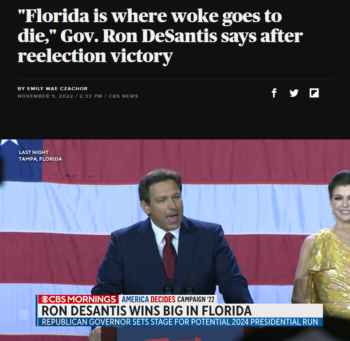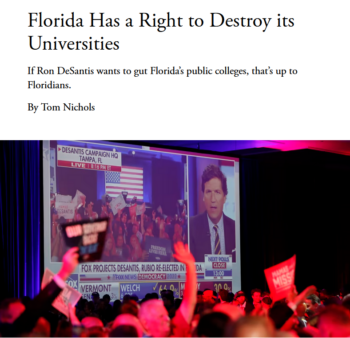As Right Media Hail DeSantis as 'Woke' Killer, Centrists Admire His Brand
Ari Paul

The College Board has “purged the names of many Black writers and scholars associated with critical race theory, the queer experience and Black feminism” from its Advanced Placement African-American studies curriculum after Florida Gov. Ron DeSantis—and likely Republican presidential candidate—moved to ban the curriculum in public schools (New York Times, 2/1/23).
 Sometimes you have to destroy academic freedom to save it, Joshua Rauh argues in the Wall Street Journal (2/8/23).
Conservative media took a victory lap. “Critical race theory is out, and Condoleezza Rice is in," boasted the Wall Street Journal editorial board (2/1/23). "It’s vindication for Florida Gov. Ron DeSantis.” The headline of a Journal op-ed (2/8/23) on legislation that prohibits diversity education declared, “Florida Shows How to Combat Woke Indoctrination on Campus.”
A New York Post editorial (2/2/23) called Florida an inspiration to other states, and asked for a “a leader who will step in and save the State University of New York from woke madness.”
Fox News (2/1/23) highlighted the marginalization of the Black Lives Matter movement in courses' changes, which it framed as the Advanced Placement course being "stripped of ‘woke’ content after criticism.”
The roots of BLM trace back to the acquittal of vigilante George Zimmerman in the killing of Trayvon Martin, an unarmed Black teenager, in Sanford, Florida—so the "'woke' content" Florida is being heralded for successfully suppressing is the legacy of a historic injustice in the state.
At City Journal (2/2/23), the American Enterprise Institute's Max Eden made no effort to hide the fact that DeSantis was aiming to stifle the ideas of "far-left academic ideologues"—“left,” of course, being an entirely subjective term, especially in states where Civil War revisionism still exists. Eden had earlier hailed DeSantis in Newsweek (1/31/23), adopting a John Birch Society tone as he suggested that Black studies were an "attempt to impose a far-left worldview on high school students."
DeSantis has also become a darling of the international right: The British Telegraph (2/5/23) said he should be a model for the Conservative Party as it fights multiculturalism and diversity.
Where 'woke goes to die'
 CBS (11/9/22) highlighted DeSantis' re-election as a kickoff for his presidential bid.
There’s a broader context here. DeSantis appointed several allies to oversee the prestigious New College of Florida—among them anti-anti-racism crusader Chistopher Rufo, worrying faculty that the governor wants to convert the small public liberal arts school into a conservative idea mill (Chronicle of Higher Education, 1/27/23). DeSantis has also mandated that “public colleges and universities survey students and faculty about their beliefs” (The Hill, 6/23/21). Now he’s bullied a major national player in college education into whitewashing its study of the Black experience…during Black History Month. Not very subtle.
DeSantis is offering red meat to the conservative media who are able to mobilize Republican voters by painting college campuses as left-wing indoctrination camps that mold good Christian patriots into non-binary Sandinistas; this will serve him well if he does chase the GOP presidential nomination. But he’s also accomplishing the Right’s overall censorship goals, regardless of what he does with his own political future: He has successfully used state power to suppress speech and activity that might counter racism, homophobia and the growing militarization of police.
It’s why he has proclaimed that his state is where “woke goes to die” (CBS, 11/9/22)—using an African-American Vernacular English expression that signifies awareness of social and racial injustice. DeSantis joins the tradition of another defiant Southern governor, Alabama's George Wallace, who stood in a schoolhouse door in 1963 to oppose racial integration—but while Wallace represented a dying old order, DeSantis actually has a shot at national power.
This is what makes DeSantis a hero in conservative media. New York Post columnist Karol Markowicz (2/3/23) claimed that "leftist" corporate media like CNN are, by contrast, suffering from “DeSantis Derangement Syndrome.” In fact, more centrist media are in no way hammering DeSantis with the same vigor that their right-wing counterpoints are defending him—and that lack of symmetry is illustrative of the truncated political spectrum of corporate media.
'Builds his brand'
 While right-wing outlets depicted Ron DeSantis as a role model, more centrist publications like the New York Times (2/9/23) presented him as...a role model.
With the headline “DeSantis Takes On the Education Establishment, as He Builds His Brand,” the New York Times (1/31/23) treated the story with a both-sides, political horse race approach that downplayed the severity of the issue at hand.
It was even more curious that Times columnist Pamela Paul (2/3/23) wrote about the collegiate struggle against woke word-policing and academic censorship without even mentioning Florida.
What Paul misses here is that the main reason journalists and academics find their jobs in jeopardy for saying something controversial is because this generation of media and academic workers enjoy less job protections than their elders. For example, she reported that Hamline University “had refused to renew an art history professor’s contract because she showed an artwork that some Muslim students may have found offensive,” though it reconsidered this move after popular outcry.
But this wasn’t the result of oversensitivity or Islamic policing of US academia. The problem was that the instructor had no tenure or other job security, which, in an era where colleges are employing a customer service model of education, which means one’s scholarship is meaningless against any tuition-payer who wants to “speak to the manager.” Acknowledging this would pin the problem on neoliberalism and managerial capitalism, which is something the Times can’t do.
But Paul—who I am happy to report is no relation—wasn’t done. She followed up (2/9/23) saying liberals should "learn from Ron DeSantis" rather than fight him:
If ideological conformity has taken root in American universities, long a bastion of liberal ideals, then Democrats are the ones with the knowledge, experience and record to attend to the problem. It’s on liberals to check the excesses of illiberal orthodoxies rampant among those on its far-left wing. It’s on us to ensure academic freedom and the kind of educational system parents can trust.
'The state's legitimate power'
 In the Atlantic's theory of free speech, harsh criticism on social media may be a dangerous totalitarianism (8/31/21), but governments actually banning ideas is just the democratic process in action (1/30/23).
Paul isn’t the only pundit who brought a blame-the-victim approach to the issue. Tom Nichols at the Atlantic (1/30/23) framed Florida's ideological purge as the consequence of democracy:
If Ron DeSantis wants to put [Rufo] in charge of a “top-down restructuring” of a Florida college, the governor has every right to do it.
Elections have consequences. If the people of Florida, through their electoral choices, want to wreck one of their own colleges, it is within the state’s legitimate power to do so.
As a New England resident, Nichols declares, "I couldn’t care less what kind of damage Florida does to its own schools." That contrasts a bit with the magazine’s series, “The Speech Wars,” which tends to present controversies over free expression in more alarmist tones, as when the magazine's Conor Friedersdorf (9/21/19) warned: "Campus-speech restrictions jeopardize society’s ability to seek truth and advance knowledge." (“The Speech Wars” project, incidentally, receives part of its support from the right-wing Charles Koch Foundation.)
But then, Nichols says that he agrees there's "some truth to the charge" that "colleges have, in fact, become ridiculously liberal,” as he has written on “some stories of campus boobery.” So he does share some ideological common ground with DeSantis, even as he scorns him for his populist pretensions.
Intervening in college affairs
DeSantis is the most successful and high-profile Republican leader to crusade against academic freedom and free speech on campus, but there is no shortage of examples of this political trend.
Right-wing control of North Idaho College’s Board of Trustees has shown how the right can take electoral action to intervene in college affairs directly (Chronicle of Higher Education, 3/15/21). Georgia’s Board of Regents, appointed by the Republican governor, moved to make the tenure process more onerous and give the board more oversight (WABE, 10/13/21), while Republican Texas Lt. Gov. Dan Patrick said he would “push to end professor tenure for all new hires at Texas public universities and colleges” in order to fight “faculty members who he says ‘indoctrinate’ students with teachings about Critical Race Theory” (Texas Tribune, 2/18/22).
 Chalkbeat (2/1/22).: "At least 36 states have adopted or introduced laws or policies that restrict teaching about race and racism."
And thanks to the state legislature in Louisiana, “a task force to study tenure policies at the state’s colleges and universities” is “worrying [Louisiana State University] faculty members that lawmakers may pass laws aimed at limiting academic freedom” (Reveille, 8/6/22). Conservative donors at Yale University were able to pressure at least one professor into resigning her post (New York Times, 9/30/21). All over the country, conservatives are looking to legally ban Critical Race Theory (Chalkbeat, 2/1/22).
In other words, the news with DeSantis and the College Board isn’t just “building his brand” for the campaign, or the consequence of democratic outcomes, as the Times and Atlantic suggest. Rather, it is another material victory in the right’s long war against higher education, one that more or less started when National Review founder William F. Buckley published God and Man at Yale in 1951.
DeSantis is emboldening Republicans in other states to amp up the campaigns against higher education. Following his lead, South Carolina lawmakers (Chronicle of Higher Education, 2/8/23) have sought “information from the state’s 33 public colleges and universities regarding all spending on programs, trainings and activities targeted toward people based on their race, ethnicity or sexual orientation,” defining
diversity, equity and inclusion programs as, among other things, attempts to take an official institutional policy on concepts such as unconscious or implicit bias, cultural appropriation and microaggressions.
As a likely contender for the White House, DeSantis is telegraphing that if elected, he will rein in the power of educators and encourage the closing of the American mind. Anyone in the United States who cares about free speech and academic freedom should be alarmed; so far, DeSantis is polling well (538, 1/10/23).
Outlets like the Times (e.g., 2/10/23) and the Atlantic (e.g., 2/4/23) spill a lot of ink about whether “wokeness” is hampering our discourse (FAIR.org, 11/17/21, 3/25/22). It would be refreshing if they put this question in the context of the Republican-led assault on learning and debate—because right-wing media certainly do.
|
